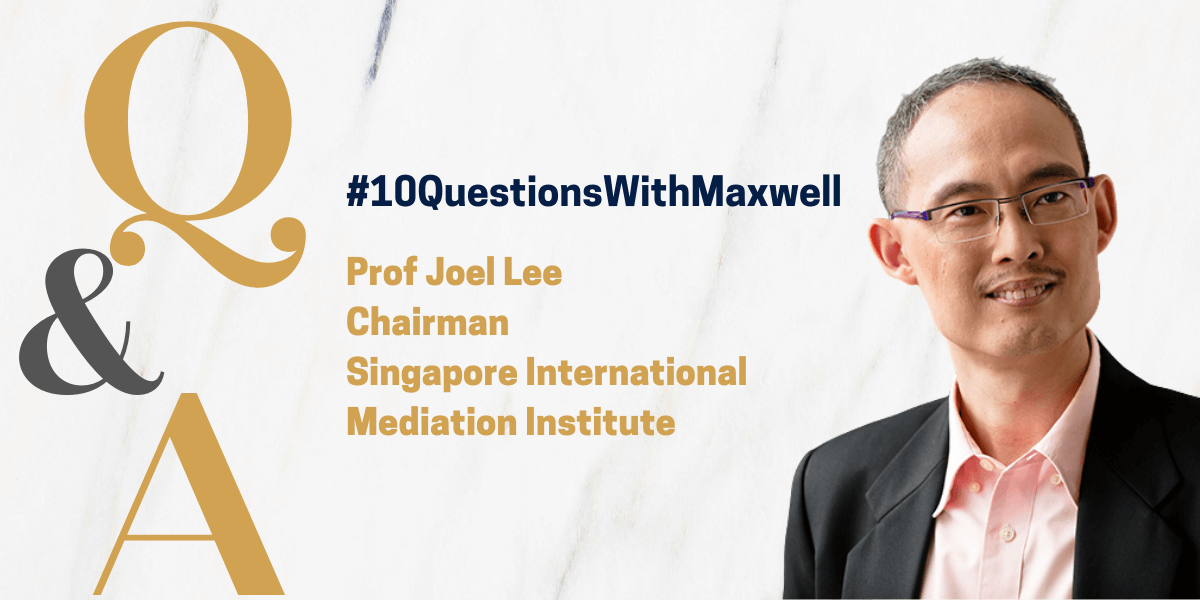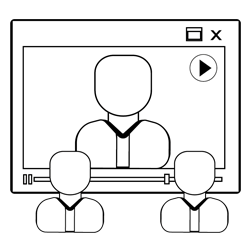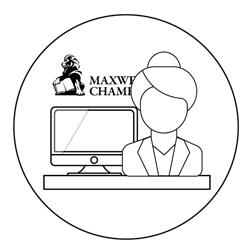Interviews

[Special Issue] #10QuestionswithMaxwell Interview Series: Prof Joel Lee, Singapore International Mediation Institute
This interview is released in conjunction with Singapore Convention Week 2021.
For the second #10QuestionsWithMaxwell feature for #SCWeek2021 special issue, we reached out to Prof Joel Lee, Chairman of Singapore International Mediation Institute (SIMI). As a Professor at the Faculty of Law, the National University of Singapore (NUS), he co-pioneered the teaching of Negotiation and Mediation in the Singapore Universities and has played a significant role in furthering the development of mediation in Singapore.
In this interview, Joel shared his teaching philosophy, what he think are the key ingredients to being a good negotiator/mediator, some advices to young individuals who are looking to get into the field of mediation and more.
Read his full interview below:
Q: When did you decide you wanted to be a mediator?
A: I don’t think it was ever a conscious choice of mine. I read law in New Zealand and was exposed to negotiation and mediation. In 1993, I came back to Singapore, got called to the bar and started teaching in National University of Singapore (NUS). That was also when Singapore was beginning its mediation journey. So, by happy coincidence, I got involved with the mediation movement fairly early on.
I had the opportunity to train the Singapore Mediation Centre (SMC)’s first set of mediators to mediate commercial disputes in Singapore. When I went for my Masters in Harvard, one of my classmates was Ms Teh Hwee Hwee, who subsequently became the first Executive Director of SMC (which was also previously known as Commercial Mediation Service). Fundamentally, because we knew each other and SMC wanted to train the first set of commercial mediators, she invited myself, Prof Lawrence Boo and Prof Lim Lei Theng to conduct the training. So, we were very involved with the startup of SMC right from the beginning.
Q: You teach at the Faculty of Law in National University of Singapore. Could you share with us your teaching philosophy?
A: Fundamentally, I don’t believe in the idea where the teachers know everything and students are empty cups waiting to be filled. I like to think that I learn from my students as much as they learn from me. A lot of the lessons in class are co-created especially in subjects like negotiation and mediation.
Secondly, students should learn how to learn. Figuring out the right questions to ask, so they can continue learning. It isn’t always just about the content of the subject.
Lastly, my class has to be fun. I actually get bored easily and I tell very bad jokes (as my students tell me). There should be activities to promote active learning. In my negotiation or mediation class, I make the students negotiate/mediate from the first lesson even when they don’t know anything about mediation. The whole idea is to make the mistakes and let them construct lessons from it.
Q: In negotiation and mediation classes, has moving online has affected the way class is conducted?
A: I think there are pros and cons of online teaching. Some people tell me it’s not possible to teach negotiation and mediation online, but I don’t really agree with that. There are actually a lot of things you can do online that you can similarly do face-to-face, you just have to find other ways to do it. So, I haven’t found that COVID has affected my teaching so much. In fact, I found that in some cases, I’m able to reinforce information better because I can conduct additional activities like polls, and students can type their questions in the chat while I’m talking, which is not possible while teaching in-person because it interrupts the flow of the conversation. Of course, if you ask me what my preference is, I would say I rather conduct my classes in-person. However, if I have to do it online, I’m good with it too.
Q: Throughout your career, who was (or were) your biggest inspiration(s)?
A: I was inspired by my teachers in law school. One of whom introduced me to amicable conflict resolution – negotiation and mediation – which inspired me to study and practice further.
I’m inspired by the work of the late Prof Roger Fisher, whom you might know as the “grandfather” of principled negotiation. He wrote the book “Getting to Yes” and was the one who started the Harvard Negotiation Project at Harvard Law School.
I’m also inspired by people whom I have negotiated with, worked with, mediated with. One example is one of Prof Roger Fisher’s students, Tom Schaub, who is also an awesome conflict resolver and trainer. I’ve learned a lot from him and was inspired by a lot of his life’s work.
These would be my three sources of inspiration. If I look back, I can see myself replicating some of the things they did or said. Till this day, I still look up to them and their life’s work as an inspiration.
Other #10QuestionsWithMaxwell interviews you may be interested:
George Lim SC | Lim Tat | Hazel Tang | David Bateson | Prof Lawrence Boo | Dato’ Jude P. Benny
Q: What is one major development you are anticipating in the new ADR space?
A: I believe virtual or hybrid mediation will be increasingly prevalent. COVID-19 has forced us to shift online very quickly and people are adapting to it. People are finding more and more advantages to it. For example, Singapore’s mediators can now mediate international disputes without having to fly anywhere as it’s only a Zoom call away. Mediators can also talk to each parties separately within a short transition period. Whereby in-person, it will usually take some time to gather parties around to talk.
Q: What do you think are the key ingredients to being a good negotiator/mediator?
A: You have to be a very good listener. You must be able to accept different perspectives – your perspective, the perspective of the other person and the perspective of an observer. You also need to be very patient and persistent. Sometimes, the parties may not fully know what they want. When you question them, they might get frustrated. So, you have to be firm but at the same time, gentle. You need to have a good eye on the process – keep an eye on the big picture and see where you are in the conversation. You need to have a collaborative and problem-solving mindset. Having good people skills is also important. All in all, I think these are critical parts of being a good negotiator or mediator.
I know that some people say you are either born with these characteristics or not, and I disagree with that. These are all skills that you can build, learn, develop, refine and perfect. If I don’t think people can gain good people skills, I wouldn’t be teaching or training people to be mediators.
Q: Could you share more about your mediation style?
A: I would say my mediation style is generally as a facilitator. As a mediator, I’m generally less interventist, which has its pros and cons. Although some clients prefer a more interventionist mediator, I would prefer to hear from all the parties, figure out what they see is the problem and then guide them into thinking about solutions. Over the years, I realised that works very well. However, some of the time, some clients will want you to provide a little bit more direction and guidance, maybe even telling them what to do. That doesn’t really fit with me because as much as possible, I want them to be engaged. So, you can think it kind of matches my philosophy of teaching. It’s a co-creation process and I want the clients to be a part of it and involved rather than me telling them what to do.
Q: Do you think mediation is usually for people that already have some experience or can fresh graduates also be a mediator? Could you share some advices to young individuals who are looking to get into the field of mediation?
A: Yes, I believe fresh graduates also can be a mediator, as long as they have the skills and talent. The hard truth is, whether people will give them work is a separate issue. I can think of young people whom I know are excellent mediators, but don’t get given work because they are just not old enough or do not have the experience. Somehow, seniority does make a difference and it is of course very hard to get experience if you don’t get given a chance to mediate!
In the last 7 years, I have made it my practice that every time I get appointed as a mediator in a case, I will negotiate with either the service provider, the lawyer or the clients to take on a co-mediator with no additional cost to them. I will usually bring on somebody who is relatively junior or mid-level so that they can get the experience. From the client’s perspective, they can get two for the price of one. From my perspective, it’s also a benefit because two heads are better than one. I have had younger mediators come up with ideas that would never occur to me. So, I think as senior mediators, we have to have a sense of responsibility to develop the younger people.
Q: Could you share with us your plans for Singapore International Mediation Institute in the next 2-3 years?
A: SIMI conducts talks and training to educate the public about mediation, as well as to educate the the future users of mediation. As such, we run programs for students in educational institutions to raise their awareness of mediation as a way to resolve business disputes. This is our long-term strategy to increase the demand for mediation. Of course, it may be that we will not see the fruits of these efforts until some years later.
We are also currently looking at consolidating our activities. Since 2014, we have basically been letting the garden grow. From now and into the next couple of years, we will be pruning the garden bit by bit, taking stock and consolidating what we have done. For example, what we do well, we continue; if something is not doing well, we will see how we can improve it. Once we reach that point, I want to be looking at how to get SIMI’s standards to be even more widely accepted internationally. Other than that, we do have some ideas for new schemes, not just for mediators but for lawyers and law firms as well. The general idea is to support this ecosystem so that more mediation work gets created.
Q: Lastly, share 3 fun facts not many know about you.
A: First, like I shared in my earlier question about my teaching philosophy, I get bored very easily and tell very bad jokes.
Second, I run a martial arts school where I teach Wing Chun (詠春拳). I’m a fifth-generation disciple of Yip Man (Ip Man). I’ve been practising Wing Chun since 1988 and teaching since 2006.
Third, I used to be a magician. I joined the Singapore Association of Magicians at the age of 12 and I think I was the youngest member at the time. However, I have since retired from active performance. However, fun fact; whenever I conduct trainings at Maxwell Chambers for the Singapore International Mediation Centre (SIMC), I always end the training with a magic trick.











